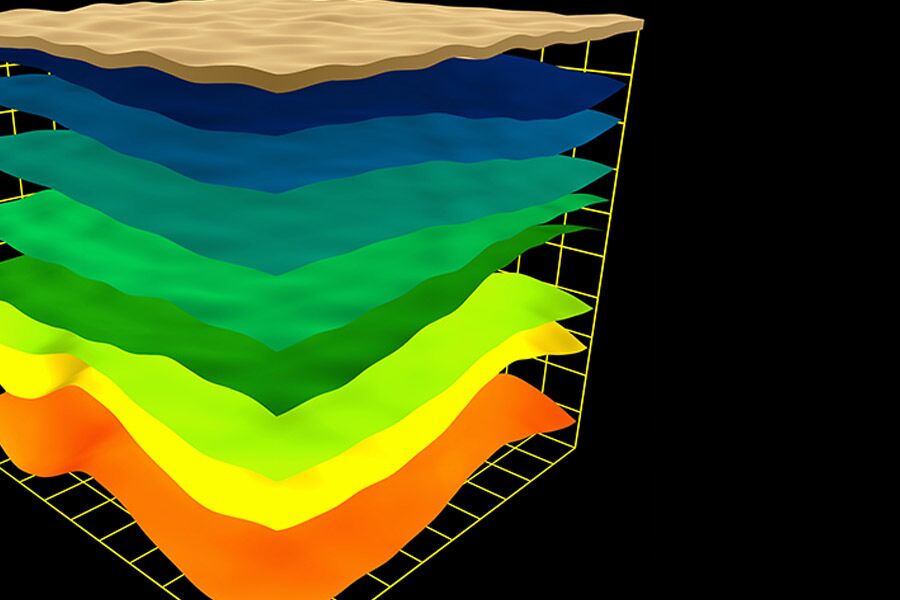Fundamentals of Reservoir Engineering
$3,895.00
|
What you will learn
- Petroleum geology and its impact on reservoir performance
- How to plan data acquisition to obtain sufficient data to establish rock and fluid properties
- Various reservoir drives and understanding of related reservoir performance.
- The industry established techniques (deterministic and probabilistic) to book and maximize oil and gas reserves
- Well production optimization and how to select candidate wells for workovers
- How to use the well testing tool as an effective reservoir management tool
- Causes of water production and how reduce/control water production
- Screening process for enhanced oil recovery schemes.
- How to design and implement waterflood projects
- How to estimate the incremental oil recovery from E.O.R schemes
- How to monitor the performance of E.O.R schemes to achieve the targeted reserves/production level.
- The characteristics of unconventional reservoirs; such as, tight sands, Shale gas, CBM, including the new techniques to estimate reserves and production profile
- Horizontal well applications including Multi-stage fracing optimization and performance evaluation
Description
This course offers the know-how knowledge to make the everyday decision-making become simple: How to plan data acquisition? What kind of data is needed? How to use the data as a reservoir management tool? How to increase ultimate recovery & projects’ NPV’s? The theory concepts will be covered to assist reservoir and exploitation engineers to effectively understand and perform their main tasks; determine oil and gas reserves and maximize hydrocarbon recovery under primary, secondary and tertiary schemes with emphasis on the bottom line results. Other topics such as well test analysis, horizontal well applications, and reservoir drives will be covered. Interesting class examples using actual field data will reviewed. A course hand-out which is an excellent reference will be provided.
Event Locations and Dates:
Contact us for Locations and Dates at [email protected]
* This course is available for in-company delivery.
Curriculum
Petroleum Geology- Origin of the solar system and depositional environments
- Geologic cycle/time and types of reservoir rocks
- Main elements of petroleum reservoirs: hydrocarbon migration & trap
- Porosity types, permeability definitions: relative, absolute, and effective
- Rock wettability and capillary pressure (class problem)
- Hydrocarbon classifications and the use of the phase envelop chart
- Fluid behaviors; oil and gas physical properties (class problem)
- Fluid sampling and PVT analysis
- Primary, secondary, and tertiary recovery schemes
- Performance characteristics of different reservoir drive mechanisms
- Volumetric, material balance, and probabilistic methods (class problem)
- Decline curve analysis (class example)
- Empirical (Russian method!) and statistical method
- Darcy equation and boundary conditions
- Inflow performance relationship (IPR), and well allowable
- Test objectives (well, reservoir) and the use of different test types
- Buildup analysis (skin factor, reservoir press., boundaries) (class problem)
- Reservoir limit and gas well testing (case study)
- Time to break-through and critical rate determination
- Estimate of water influx (steady-state and unsteady-state methods)
- Review and screening of EOR schemes
- Scheme planning and design (case study)
- Performance monitoring of waterflooding and recovery factor prediction
- Gas content, reservoir characteristics, and production profiles
- Production mechanism and reserves determination
- Use of specialized techniques to estimate reserves for the unconventional:
- Rate Transient Analysis (RTA): flowing material balance, Blasingame and Fetkovich type curves, and rate normalized method
- Modern Decline Curve Analysis (DCA), such as: Power Law Exponential, Stretch Exponential, Duong’s method, Modified Hyperbolic, etc.
- Case studies
- Well productivity, well drainage area and optimum well spacing
- Design optimization and performance analysis of multi-stag Frac Horizontal Wells (MFHW’s).
- How to minimize geologic, drilling, and completion risks
- Well test interpretations for MFHW’s
- Reserves estimate and definitions of SRV and CRV
- Case studies
Target Audience
This course is aimed at reservoir, petroleum and exploitation engineers/technologists, geophysicists, and geologists who are involved in field development and exploitation.Specification: Fundamentals of Reservoir Engineering
|
About the Publisher
-
Saad
- Store Name: Saad Ibrahim
- Saad Ibrahim, P.Eng., an independent consultant and president of Petro Management Group Ltd., established in Calgary (1994). Graduated from the University of Alexandria (Egypt) with B.Sc. in ... Read More > Read More
Reviews
0.0
Be the first to review “Fundamentals of Reservoir Engineering” Cancel reply
You must be logged in to post a review.
$3,895.00
$3,895.00
Secure encrypted payment
All Credit cards Accepted
|

There are no reviews yet.